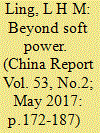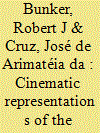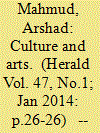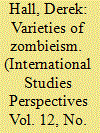| Srl | Item |
| 1 |
ID:
153118


|
|
|
|
|
| Summary/Abstract |
The concept of ‘soft power’ impoverishes our understanding of politics. It assumes (i) the world has never
encountered instances of ‘soft power’ before or knows no better when encountering it; (ii) culture cannot
have any interests, agency or impact of its own; and (iii) it cannot capture the state. History—especially
from India and China—debunks these assumptions. I propose a contrasting concept, cultural power.
It turns ‘soft power’ on its head by (i) articulating the state as ontology, not instrument; accordingly,
(ii) culture can generate its own centre (or centres) of gravitas that (iii) invariably outstrips the state in
purpose and identity. To demonstrate, I draw on recent filmic representations from India and China.
These replay the power of historical culture, like Hindu reincarnation and/or Confucian love, through
a contemporary venue. I conclude with some implications of cultural power for politics, in general, and
world politics, in particular.
|
|
|
|
|
|
|
|
|
|
|
|
|
|
|
|
| 2 |
ID:
142617


|
|
|
|
|
| Summary/Abstract |
This essay provides an overview of the eras of Mexican cinema followed by an analysis of 10 Spanish-language narco cinematic representations, an overview of the eras of American cinema followed by an analysis of 10 English language narco cinematic representations, and a conclusion that compares and contrasts the Mexican and US narco war cinematic experience. Due to divergent national trajectories – Mexico is engulfed in narco violence and corruption while the United States is not – more differences than similarities exist between these national cinematic genres. Dark spirituality themes are also increasingly evident in more recent narco war films.
|
|
|
|
|
|
|
|
|
|
|
|
|
|
|
|
| 3 |
ID:
127946


|
|
|
| 4 |
ID:
092392


|
|
|
|
|
| Publication |
2009.
|
| Summary/Abstract |
This article reflects some experiences in teaching International Relations (IR) by using films to supplement the use of simulations and role play scenarios. The authors have used simulations and role play scenarios in order to teach complex issues and theories, and to engage the interest of students. By using films to supplement the use of simulations in classrooms, it is suggested that students become more active in their own learning. A number of ways in which simulations and role play can be used in teaching are established here alongside an array of films that can be shown to students to complement such teaching approaches. The use of films to teach IR theory is also listed. It is concluded that the use of simulations, role play, and films in teaching IR can aid student learning especially in terms of IR theory.
|
|
|
|
|
|
|
|
|
|
|
|
|
|
|
|
| 5 |
ID:
145460


|
|
|
|
|
| Summary/Abstract |
A number of popular Pakistani films feature rapes and attempted rapes, supporting a rape culture that needs to be problematised. I analyse these films and demonstrate that this gendered form of violence serves multiple functions, providing the audience with gratuitous entertainment, developing the narrative and/or punishing women. These functions, which are by no means unique to Pakistani film, incite, excuse and normalise sexual aggression, so supporting a strong rape culture. I also draw attention to more culturally specific honour-based ideologies in these films and demonstrate how these can also encourage and legitimise rape. This leads to a more holistic understanding of what this local rape culture entails. I show that the mainstream film industry has consistently portrayed this culture and suggest that filmmakers’ allegiance to such narratives has therefore amplified the promotion and reproduction of a rape culture in Pakistani society.
|
|
|
|
|
|
|
|
|
|
|
|
|
|
|
|
| 6 |
ID:
102936


|
|
|
|
|
| Publication |
2011.
|
| Summary/Abstract |
This paper argues that the frequent references to zombies in analyses of the recent global financial crisis can be harnessed as a "teachable moment" for students of Comparative Political Economy. I claim that two zombie movies in particular-Britain's 28 Days Later and Japan's Wild Zero-can be viewed as if they were allegories of two different national forms of capitalism that are integrated into, and affect, the global political economy in different ways. While 28 Days Later displays remarkable similarities to Marxist accounts of the origins and dynamics of capitalism in England, Wild Zero can be seen as an account of the post-1985 dynamics of the Japanese political economy and its engagement with Asia. This paper gives concrete suggestions for the use of zombie films in the classroom. It concludes with the argument that these two films help to explain why references to "zombie capitalism" cross ideological lines.
|
|
|
|
|
|
|
|
|
|
|
|
|
|
|
|